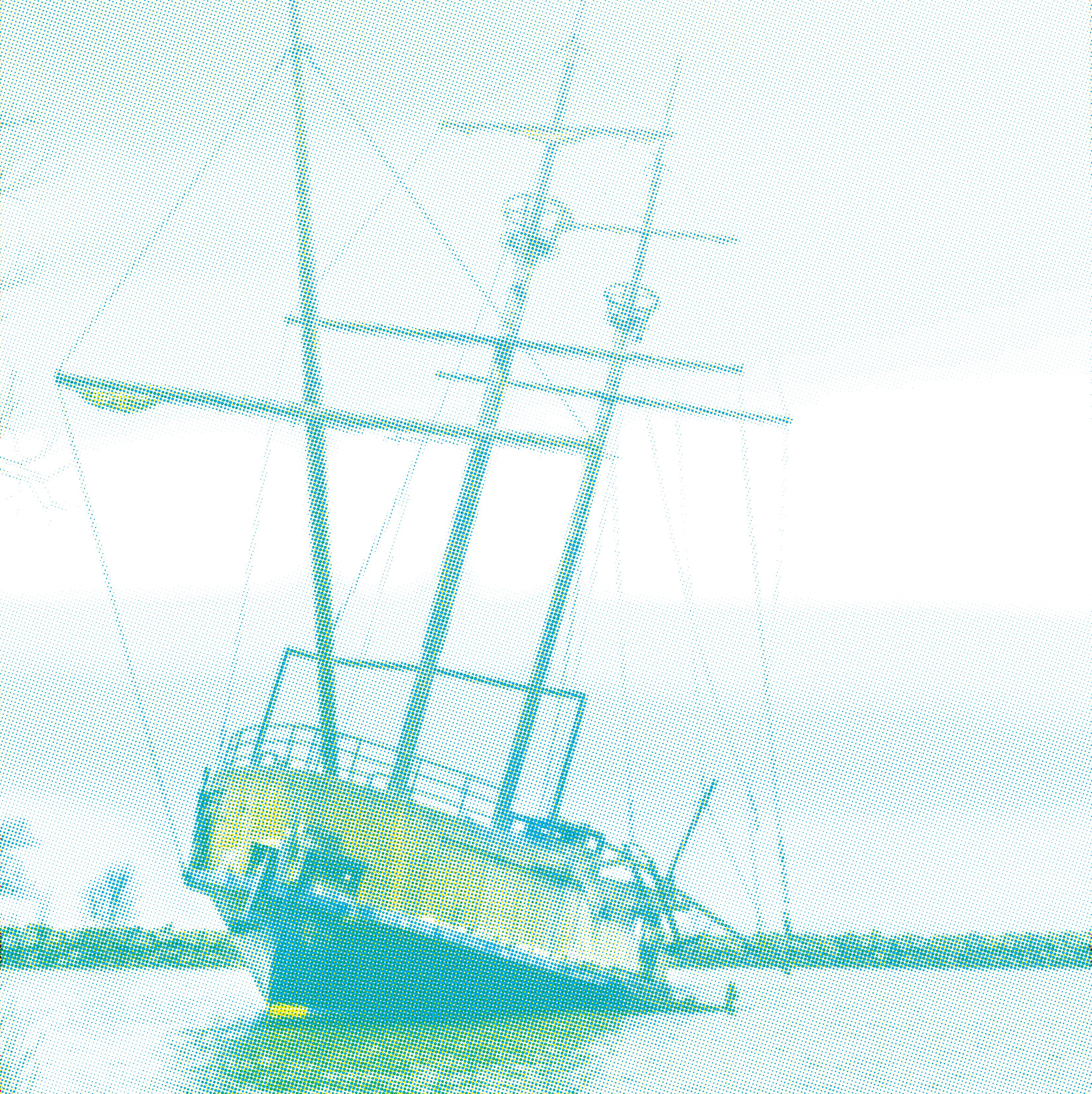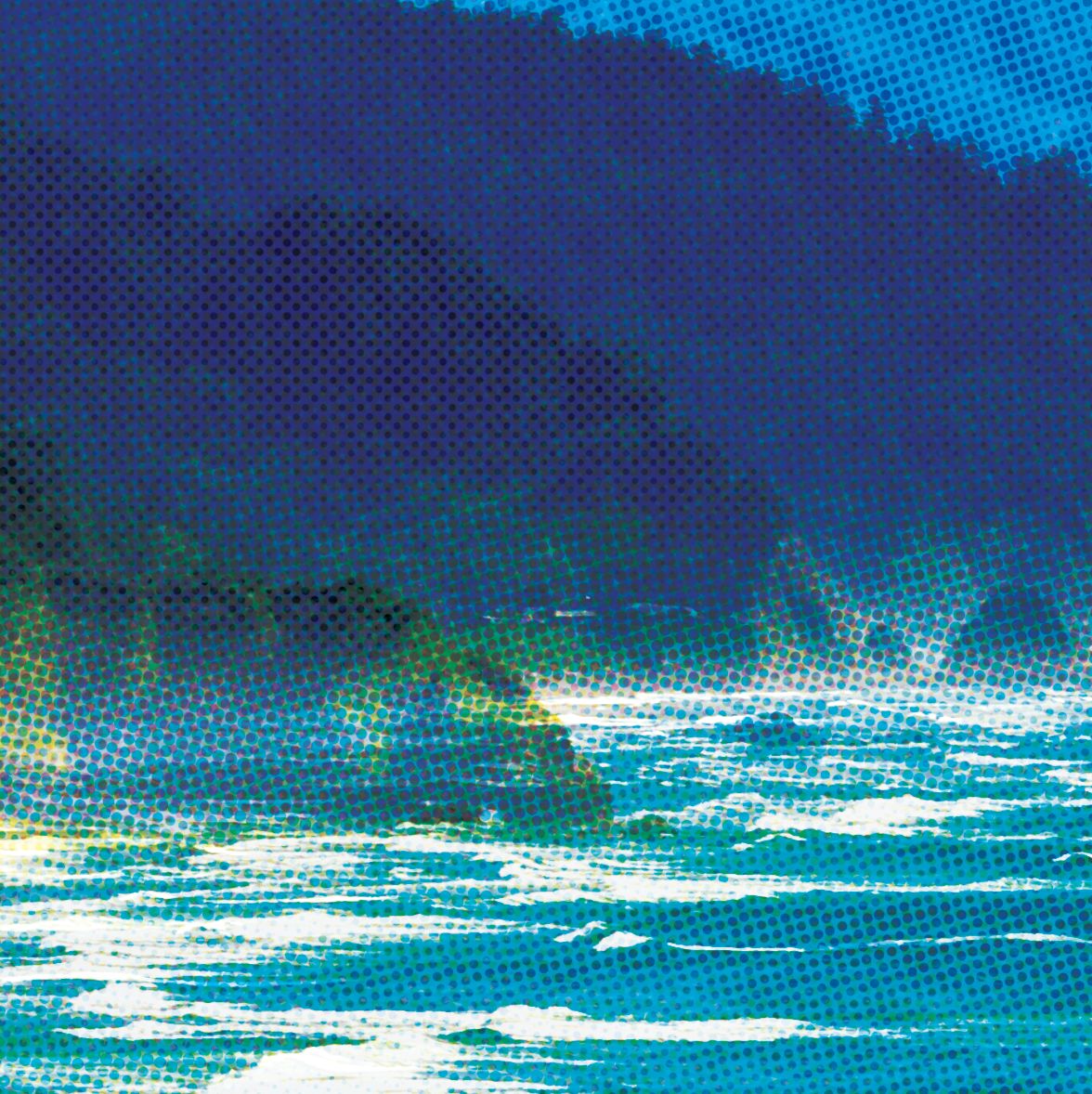Trail: A Short Story by Omar El Akkad

The old red pickup truck ahead of Abdulaziz on Highway 26 was leprous with rust and covered in bumper stickers. One featured a flag Abdulaziz had seen many times before in the small rural towns surrounding Portland, even though his American classmates at Portland State reassured him it was really only a Southern thing. Another declared the driver a certified ISIS hunter. Others were obscured by the flapping tail of a poorly tied rain tarp covering the truck bed. Abdulaziz, bored now by the endless forested hills through which Highway 26 scythed and wriggled on its way to the Pacific Ocean, wanted very much to get a closer look at the bumper stickers. But he instead eased off the gas pedal and put a little more space between his rental car and the beat-up red pickup. He’d heard things about the sort of Americans who drove this sort of truck. He’d never talked to one, but he’d heard plenty.
“Brother, let’s just go home,” said Abdulaziz’s friend Faisal, reclining the rental car’s passenger seat as far back as it would go; the sun that moments earlier flashed blue and blinding against the lenses of his Armani sunglasses now fell on his lap. “What’s the point of this?”
“There’s no point,” Abdulaziz replied. “Not everything has to have a point.” He waved his hand across the width of the windshield, which framed the vastness of Oregon woodland ahead of them, forests saddled high on the backs of mountains, the lush western border of the Willamette Valley. “While we’re here, we should experience this. You’ll miss it when we go back home.”
Faisal laughed. “Experience what, exactly?” He shook his head. “You’ve been spending too much time with these people, brother; they’ve convinced you they invented the idea of walking outside. I swear, you could get eaten by a bear out here and you’d still pretend you were having a good time.”
This was their last year together as friends untethered from the world into which they’d been born and to which they would soon be compelled to return. They’d met six years earlier as freshmen, newly arrived from Saudi Arabia and disoriented in that overwhelming, exhilarating way unique to foreign students. Now, an undergraduate degree and an MBA later, they’d become veterans of sorts, unofficial deans of Portland’s Arab student corps. But there were no more degrees to be had, no more putting off the life that lay waiting back home, immaculately planned in accordance with ironclad tradition. Spring was ending, and with it their time abroad.
“What’s the name of the road again?” Abdulaziz asked.
Faisal fumbled with a set of directions written on the back of a Kleenex box. “Nehalem. It says left on Nehalem.”
“Didn’t we pass that already?”
“How the hell should I know? Don’t drive me out to where the phones don’t work and then ask for directions.”
Faisal shifted onto his side and soon was snoring. Abdulaziz turned on the radio; he found only one signal among the static, a talk radio station playing infomercials. With great excitement, a disembodied voice spoke at length of the easy fortune to be made flipping real estate.
Up ahead, far along the sides of the snow-dipped mountains, Abdulaziz noticed a sameness in the shape of the trees. Beside the highway the forest was chaotic and wild, but in these distant mountainside patches the trees grew grid-like in neat rows, like the desks in a grade-school classroom. These were the spots, Abdulaziz guessed, where logging companies stripped the land and
afterward, driven by conscience or profit motive or mandated by law, replanted the barren ground. The new trees were an imperfect replacement for the wildness that used to be and in their identical genetics they were susceptible now to mass death at the hands of a single disease. But even this, Abdulaziz supposed, was preferable to emptiness.
Staring at these faraway uniform squares of trees, Abdulaziz was surprised to find himself reminded of home. The place of his birth of course looked nothing like this; where here the land bulged and swooped unheeding into the ocean, home lay flat and mostly featureless, the desert undistinguishable from the contours of its horizon, dotted with churning pumpjacks and sharp-limbed palms.
And yet at the sight of the harvested and replanted trees Abdulaziz couldn’t help but recall his first trip as a child to the vast oil fields outside Dammam—those endless rows of wells whose torrents of glistening blackness turned desert into Kingdom. And in this way these two places, so otherwise dissimilar, were kin. And maybe all other places shared this trait—maybe there’s never been any other way to exist but by the grace of whatever one’s claimed acre of earth deigned to vomit.
Caught in these thoughts, eyes cast on the farmed trees, Abdulaziz didn’t notice his foot easing back onto the gas pedal, the car quietly gaining speed. It wasn’t until he looked back to the road that he saw his car’s fender inches away from the pickup truck’s sticker-plastered bumper. Abdulaziz slammed on the brakes, startling Faisal awake. The rental car’s tires screeched a little and quickly the two cars regained their previous separation. But through the truck’s rear windshield, Abdulaziz could see the reflection of the broad-shouldered driver’s eyes, which moments ago might have been focused on the road ahead but were now focused, through the rearview mirror’s reflection, squarely on him.
In the departures hall in Riyadh, Abdulaziz hugged his mother and kissed his father on each cheek, a mechanical all-purpose greeting he’d learned from a young age and which every time made him cognizant not of intimacy but of a great and formal distance, unspoken and beyond bridging.
In farewell his father said, “Be a good Muslim.” And for a moment Abdulaziz paused to consider what such a thing could possibly mean. But of course he knew it was a prohibitory command concerning all the salacious things his father associated with that most foreign of countries—that place which, unlike his homeland, had long ago given up any pretense of suppressing its vices. And to ask what it meant to be a good Muslim was, surely, the sign of a bad one. So Abdulaziz said nothing.
Instead he walked to where Chanapan the houseboy stood, luggage in hand. But instead of taking the bags from his servant, Abdulaziz leaned in and kissed him on both cheeks with the same formal solemnity he had employed in bidding his father goodbye. He felt the houseboy, in whose colloquial title lay evident the disposability with which the society that employed him viewed him, freeze up. To do such a thing, to greet the servant as though he were no different than kin, was in its own way a kind of defiance. Without looking back at his parents, Abdulaziz took his luggage and made for the gate.
An hour after takeoff, the flight attendant announced the airplane had now left Saudi airspace. Not long after, some of the men and women in the first-class cabin stood and went to use the lavatories and emerged transformed, white thobes replaced with suits, black niqabs with skirts and blouses. Against an elongated sunset the plane flew westward, and the world became a different world.
“Tell me again,” Abdulaziz said.
“Nehalem, Nehalem,” Faisal replied. Agitated, he tapped the back of the Kleenex box, where the name of the road and a few auxiliary instructions had been hastily scrawled. “See? Right here? Lower Nehalem.”
“Nehalem or Lower Nehalem?”
“What difference does it make? Lower Nehalem, Upper Nehalem, Upside-down Nehalem.”
Abdulaziz scanned the sides of the highway for signs of imminent intersections, now convinced they’d missed the road to the trailhead. For the past half-hour he’d been preoccupied with trying to pull away from the old pickup truck ahead of him. But since their near-accident, the driver of the truck seemed unwilling to uncouple. Every time Abdulaziz slowed down, so would the truck, but whenever a gap in the oncoming lane appeared and Abdulaziz tried to pass, the truck would speed up, cutting off his path.
“Whatever,” Faisal said, tossing the tissue box on the ground. “We’ll go all the way to the ocean, then.”
“I’ve been to the ocean a million times,” Abdulaziz said. “I want to see the remains of the train tracks.”
Faisal shrugged. “I’ve never been to the ocean,” he said.
“What? We’ve been here six years. How could you not go?”
“Eh. It’s cold, you can’t swim in it.” Faisal took off his sunglasses, lifted his legs and put his fine-polished boots up on the dash. He squinted at his surroundings. “That’s the problem with these places that look like they belong on postcards. You get here and it never lives up.”
Beyond a small curve, another intersection appeared. Abdulaziz slowed to a near-crawl so as to read the upcoming sign, which indicated this was indeed Lower Nehalem. It was a small road, less well-paved and narrower than the highway.
It wasn’t until he made to turn that Abdulaziz saw the old red pickup truck had turned down the same road.
Urban legend told of a Sheikh’s son who arrived in Portland to earn a business degree and was hooked by the place. None of the Arab students knew if there was any truth to the story, but everyone heard it eventually.
Like any story many times recycled, the tale transmuted. But at its heart was a young man named Khalid who belonged to the upper Saudi echelons, a distant heir to the throne. He belonged, as well, to that generation of men sent to obtain degrees from Western schools—a self-interested temporary migration that mirrored the throngs of Westerners who traveled in the opposite direction in search of better pay and easier lives in the shadow of the oil fields.
One night, the story goes, Khalid left the riverside penthouse his family had rented for him since freshman year and went for a long walk. He had for years struggled with that very peculiar flavor of wealthy immigrants’ loneliness—an unhappy sensation that his relationship with his adopted surroundings was purely transactional. There was a polite coldness to the people who seemed to belong in this part of the world, he felt, and though in his years here he had purchased many items and experiences, he had been unable to buy his way around that coldness.
He walked for hours and a little after midnight ended up in the Pearl, somewhere just outside what remains of Chinatown. He saw men dressed as women entering a dive bar and, in a moment that perhaps his elders back home would consider rebellion or apostasy but was in reality a levee deep in the core of him finally breaking, Khalid followed them. When he emerged onto the street the sky was bleeding daylight and he swore he’d never go home again.
It’s said the royal family sent a secret delegation to Portland tasked with changing Khalid’s mind. Had he come from a lesser family, perhaps he could have been cut loose, the memory of him buried. But for someone so prominent there was no such possibility. After weeks of threats, pleas and goading, the delegation finally convinced Khalid to come back home. They promised him freedom from societal responsibilities, no obligation to marry the wives who, according to the intricacies of custom and political maneuvering, had been arranged for him. And even should some unspeakable calamity claim the lives of all those who stood ahead of him in the succession line, he would be spared the burden of the throne. So, quietly and never having finished the business degree he came for, Khalid agreed to go back home.
Here the story, authenticity already fraying, came apart completely. In some tellings, Khalid soon saw that whatever he had felt in Portland was only a phase, and surrounded now by his family and his community, he disavowed it. In other tellings Khalid was spirited away to the palatial grounds of one of the family mansions on the outskirts of the city and shrouded there behind gold-spiked gates, left to live unseen however he pleased.
But in another alternate ending, rarely told, Khalid never went back home. He stayed in Portland and started his own drag bar and eventually retired to a small cabin overlooking the dunes in Florence. You’d see him out there sometimes, right around sunrise during the cold low season, picking driftwood. And if you crossed paths on the beach he’d wave hello and ask where you were from and if this wasn’t just the best time of year to see the Oregon coast the way it really ought to be seen. And you’d not believe for a minute, standing there, that this man wasn’t born and raised in this corner of the world, as native to its earth as the roots of the redwoods.
That’s how Khalid’s story ended the night Abdulaziz first heard it, passed down by a senior preparing to return to the Gulf. In the years that followed, Abdulaziz heard many variations, but it was this ending he enjoyed most; there was something satisfying about it, something that made the whole story worth believing.
Still, try as he might, he didn’t believe a word.
For a moment Abdulaziz considered reversing, not continuing down the small branching road that seemed to descend right into the heart of the forest. Maybe they should just stay on Highway 26 and continue on to the ocean, stop at Seaside and buy some overpriced taffy, watch the slow gray roll of the ocean.
But he did turn, following the old red pickup truck and prompted by a vague sense that to abandon this excursion now would be to succumb to a kind of cowardice that would confirm this place had never been, even temporarily, his home.
The road narrowed. The moss-skinned trees leaned in and sliced up the sunlight. Little by little the quality of the asphalt worsened until it disappeared altogether and they found themselves driving on dirt. Then, somewhere nearby, they hear the sound of gunshots.
“What the hell is going on?” Faisal asked. He began to roll down the window to get a better look past the roadside brush, but thought better of it. “Turn around before we get killed out here.”
Abdulaziz shook his head. The gunshots were irregular in frequency but uniform in volume, suggesting all the shooting was happening in a single spot. He remembered hearing one of his American classmates talk about historical societies that went out into the woods to reenact old wars. Perhaps that’s all it was, history buffs playing soldiers.
The old red pickup truck ahead of them continued at a leisurely pace, unbothered by the potholes that easily overwhelmed the rental car’s suspension. Abdulaziz caught sight once again of the driver’s eyes in the rearview and it seemed they had never stopped looking back at him the whole time, as though the man at the wheel knew these roads so well he could drive them blind.
“What are you trying to prove, brother?” Faisal asked.
“I don’t know,” Abdulaziz said. “But we’re not turning around. We’re going hiking today, I don’t care what happens.”
The sound of gunshots grew closer.
Faisal clapped his hands in an exaggerated way, as though ridding himself of all responsibility. “Fine,” he said. “You want to feel like an American? Let’s go get shot.”
Suddenly the brush bounding the left side of the road gave way. In a clearing about the size of a basketball court, Abdulaziz and Faisal saw a makeshift firing range. A group of half a dozen men and women stood wearing ear protectors, handguns raised, firing at raised stumps of wood about 40 feet away.
The old red pickup truck came to a stop, blocking the dirt road and allowing Abdulaziz and Faisal to drive no farther.
A large man in his mid-30s emerged from the driver’s side. He had blond hair shaved almost to the scalp and the beginnings of a beer gut. He was tall and broad in a way Abdulaziz associated with the actors in those late-night TV commercials advertising a dating site exclusively for farmers. A handgun was holstered at his side. He approached the rental car.
As the man neared, Abdulaziz saw the truck’s passenger door open. Two small children, a boy and a girl aged 6 or 7, hopped out of the vehicle. They stood by the side of the road, watching their father. Behind them, some of the men and women at the firing range stopped and turned to watch as well, while others continued shooting. With every gunshot, the children flinched, but only a little.
The man stood by the driver’s side door, too close to allow Abdulaziz to open it. Abdulaziz rolled down the window. He leaned and craned his head a little until he could see the man’s face.
“You lost,” the man said.
Abdulaziz shook his head, though the man appeared not to be asking a question.
“We’re looking for the Salmonberry Trail,” Abdulaziz said. “We’re going hiking.”
The man seemed to ignore Abdulaziz’s reply entirely. He leaned forward a little and looked inside the car, eyeing Faisal up and down. Faisal stared straight out the front windshield, as though completely unaware of the man’s presence.
“Just going for a quick hike,” Abdulaziz repeated.
“That so?” the man said.
“Yes.”
The man stood back upright, his holstered weapon back in Abdulaziz’s view. With a kind of disdainful curiosity, he walked a quarter-way around the rental car, peering through the backseat window like a police officer inspecting a pulled-over vehicle. Then he returned to the driver’s side and leaned in through the window.
“You from here?” he asked.
In the silence that followed, Abdulaziz became aware that the gunfire had stopped completely; all the people who had come out to this makeshift range in the forest to shoot at stumps decorated with paper bull’s-eyes had turned instead to watch them. And in that instant, pinned under the weight of their collective gaze, Abdulaziz finally concluded there was no belonging for him here, that Khalid the Sheikh’s son could never have grown old and content in that beach house by the ocean.
What freedom existed in this place, that freedom Abdulaziz so desperately longed for the day he boarded that flight from Riyadh six years earlier, was no freedom at all, simply the sound of a million contradictory stories colliding, endless narratives predicated on the elimination of others. And in that chaos, which itself entailed a violence so much greater than that of all the handguns presently surrounding him, perhaps Abdulaziz could with great effort carve out a tiny space to call his own. But he would never belong—how could he? Even America didn’t belong in America.
“No,” Abdulaziz said, “we’re not from here. We’re just visiting.”
The man nodded. He stood and pointed down the road.
“About five miles,” he said. “Trailhead’s on the left, near side of the bridge.”
The man walked back to his truck and got inside. He pulled to the right, into the clearing, making enough room for the small rental car to pass.
Abdulaziz and Faisal drove in silence, their car the only one on the narrow dirt road. In a while they came upon the bridge and pulled over and walked down to the trailhead, which was where the man said it would be. The twisted remains of the Tillamook Bay Railroad shone under midday light.
A mile or two into the hike, they saw that the river had eaten away a portion of land, leaving the tracks suspended in air. Faced with a floating railway headed nowhere, unsure if its weakened frame could support their weight, Abdulaziz and Faisal decided against venturing farther. Before night fell, they turned and went back home.






